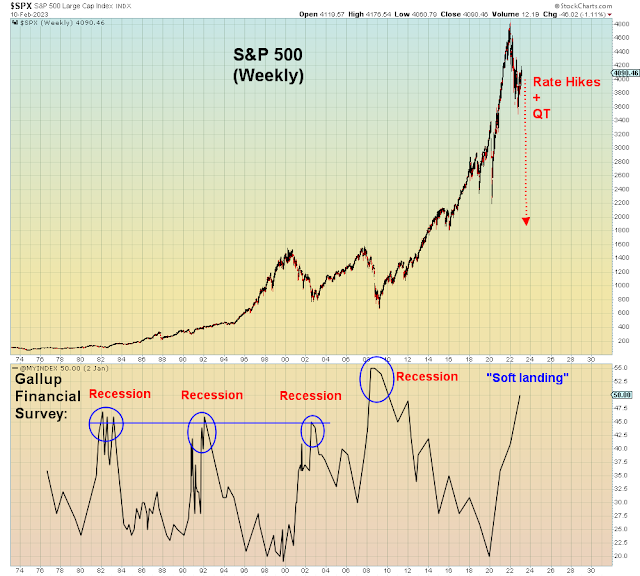The end of cycle fool's rally is ending, as it appears the last fool was finally found. Since the start of the year bullish pundits have been rounding up useful idiots to feed into the Dow Jones hopper, however the almighty Dow Jones Illusional Average has now given up six weeks of gains in three days. Amid record retail investor inflows...
Over the course of the past year, the bullish thesis has shape shifted from hyperinflation to inflation, stagflation, soft landing, and now no landing, meaning no inflation AND no recession, the delusion du jour. You have to be brain dead to believe it, hence it's now Wall Street consensus:
The "No landing" fantasy was fabricated in order to allay investor concerns that an ever-more hawkish Fed will implode the economy, as they have every other time in history. So, the *new* fairy tale is that Fed over-tightening can bring down inflation while the economy continues to grow robustly. It's abundantly clear by this level of end of cycle denial that the latest uptick in social mood has completely fried the brains of today's financial punditry.
Nevertheless, one must ask the critical question, why is Fed tightening causing the economy to reaccelerate at the end of the cycle? The main reason is because investors are front-running the Fed, causing financial conditions to ease. Consider that financial conditions have now gone nowhere for the past year, despite the fact that the Fed has raised rates MORE than they did back in 2007. However, the problem is that wages are lagging inflation, meaning "real" (inflation-adjusted) wages are negative. Therefore, consumers are increasing their debt load in order to keep up with inflation. This is manifesting in sky-rocketing credit card balances AND delinquencies. So sure, this is an "inflationary" moment, however it is far from sustainable. The inflation mentality has led consumers to increase debt, on the belief that they can grow their incomes at a pace that will offset the rising debt burden. But that's not what is happening.
Financial markets are ignoring what's happening in the underlying economy:
Ironically, this same sequence of events played out in 2008: An end of cycle rally attended by an uptick in consumer sentiment, and a Fed totally concerned with inflation. A massive policy error, and then an unforeseen collapse.
"On the morning after Lehman Brothers filed for bankruptcy in 2008, most Federal Reserve officials still believed that the American economy would keep growing despite the metastasizing financial crisis"
The transcript for that meeting contains 129 mentions of “inflation” and five of “recession.”
What does all of this have to do with casino gambling? Pretty much nothing, since money has to go somewhere hence there will always be a bullish investment hypothesis on offer, no matter how moronic. Investment managers do not get paid to sit in cash.
Another popular investment hypothesis championed by Tom Lee of Fundstrat is that fundamentals no longer matter, all that matters is the flow of funds. There is only one problem with that theory - it's not working. Not for lack of trying mind you:
"Individual investors have been snapping up stocks at the fastest pace on record as U.S. equity markets have charged higher to start the year. Over the past month, retail investors funneled an average of $1.51 billion each day into U.S. stocks, the highest amount ever recorded"
It turns out that if you pay a trillion dollars for a brick, its valuation doesn't increase, unless you find someone else who is even dumber. Generally speaking, these are not the types of people who are sitting on piles of cash.
As of Tuesday's close, the Dow has given up all gains for the year.
Meanwhile, this decline is still tracking the Feb/March 2020 crash week by week. The difference being, that one was attended by global bailout whereas this one is attended by global tightening.
Which means that investors will get to experience the excitement of real investing without a Fed safety net. Which will test the predominant hypothesis that printed money is the secret to effortless wealth.
















































